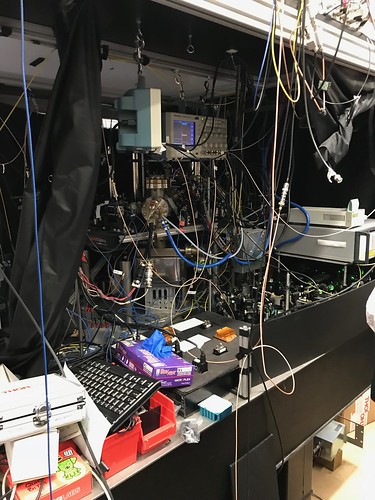Einstein's Theory of General Relativity tells us that the closer you are to a mass, or the more massive that object is - meaning, the deeper you are in a gravity well, because gravity is a property of mass - the slower time passes. It stops passing altogether inside a black hole.
It would be easy to think that these ideas are just hypothetical. But they're not. These effects have been almost trivially observed, just by taking extremely accurate clocks in airplanes or to the tops of mountains and back, and then comparing them to equally accurate clocks with which they were synchronized beforehand. The differences in the clocks matched the predictions made by Einstein's equations.

The extraordinarily precise ytterbium (Yb) lattice optical atomic clock at the National Institute of Science and Technology (NIST) laboratory in Boulder Colorado, a portion of which is shown above, measures the passage of time by taking measurements finer than the width of a hydrogen atom. It is so precise, that its output is measurably affected by a change in its vertical position from the Earth's mass of just a few centimeters.

The scientists responsible for the clock had the laboratory floor officially surveyed to determine its altitude with as much accuracy as humanly possible. That's the National Geodetic Survey (NGS) benchmark embedded in the lab floor.
The Global Positioning System (GPS) falls prey to both of these effects: orbits are a form of centripetal acceleration - satellites in orbit are continuously falling but just miss the Earth; and satellites in orbit are further away from the Earth's mass than objects on the ground. GPS depends on atomic clocks in each satellite to work. Special Relativity causes the clocks to run slow by about 7 microseconds a day relative to a clock on the ground. General Relativity causes those same clocks to run fast by about 45 microseconds a day relative to a clock on the ground. The net effect is that the GPS clocks run fast by about 38 microseconds a day.
The GPS system had to be designed to take this into account. Light - and, hence, the signals from the GPS satellites - travels almost 300 meters in a microsecond, or almost 1000 feet. Being off by 38 microseconds means positioning calculations made by your GPS receiver would be off by 38,000 feet, or more than seven miles, if the effects predicted by Special Relativity and General Relativity weren't taken into account.
Every object in the Universe - the device you're reading this on, a boulder on the planet Mars, all of the atoms in your body - is exposed to a slightly different gravity field, just by virtue of being in a slightly different place relative to all of the other objects in the Universe.
That means every object in the Universe experiences time a little differently than every other object. When you're standing, time passes more slowly for your feet than for your head just because your feet are closer to the mass of the Earth.
The cells on top of your foot experience time differently than the cells on the bottom of your foot.
The molecules at the top of a cell in your foot experience time different than the molecules at the bottom of that same cell.
The atoms in that molecule that are further from the Earth experience time differently than the atoms in that same molecule that are closer to the Earth.

There is no one time that everyone shares. Every single object has its own time, running faster for some, slower for others.
Sources
Richard W. Pogge, "GPS and Relativity", Ohio State University, 2017-03
Carlos Rovelli, The Order of Time, Riverhead Books, New York, 2018

No comments:
Post a Comment